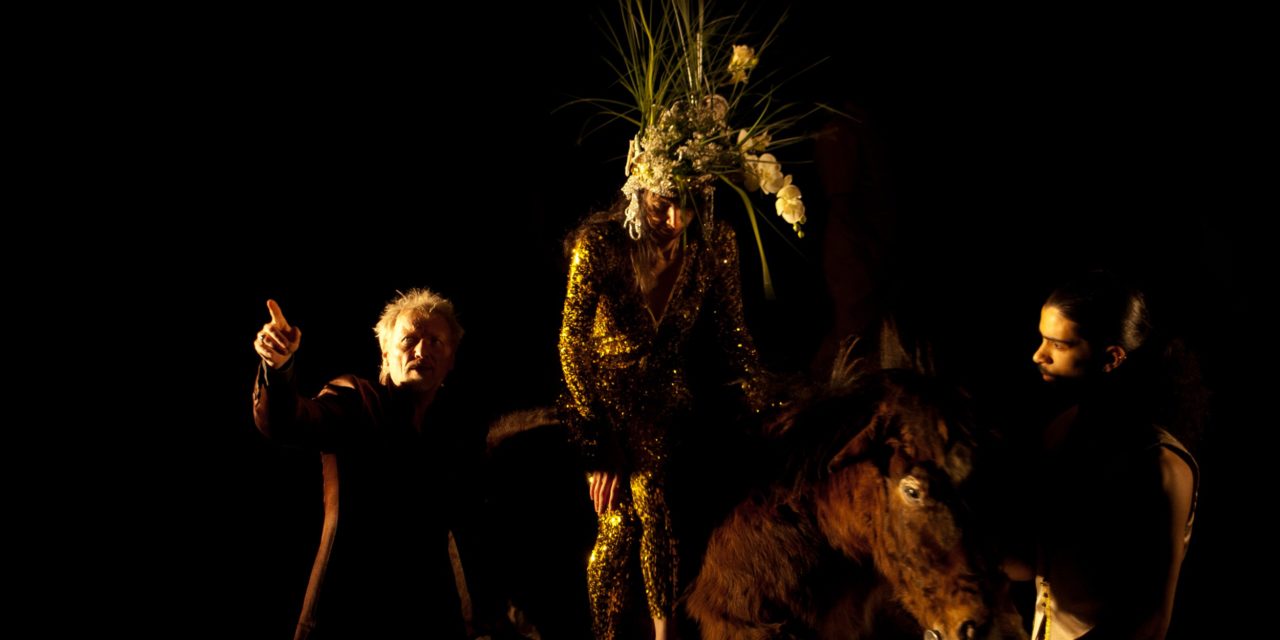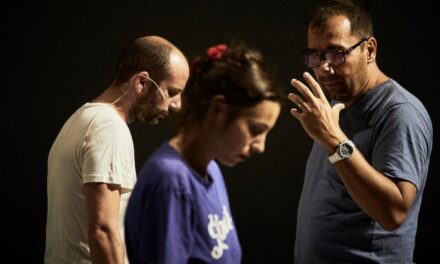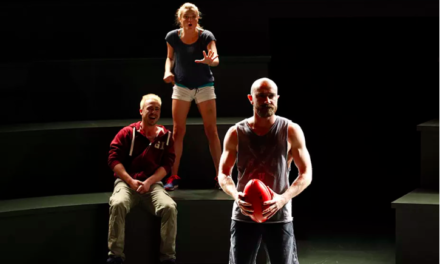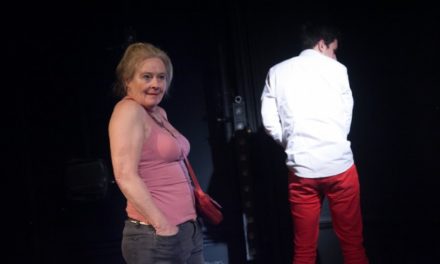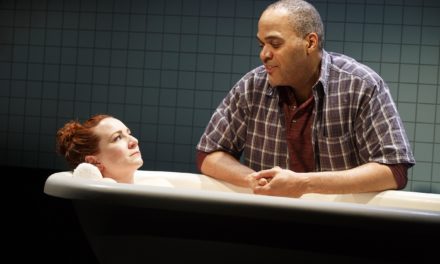How are we to live together in this day and age?
Jan Lauwers, the ‘first among equals’ at Needcompany, has been one of Flanders’ major figures for several decades. Has any gap appeared between the prestige and the artistic quality? Certainly not according to Vanhaesebrouck. He focuses on The Blind Poet (2015), which he considers exemplifies the works Lauwers has created since the highly acclaimed Isabella’s room (2004).
Jan Lauwers has been working steadily on his oeuvre since as early as 1979, not only as a theatre-maker but also as a visual artist (see recent Silent Stories exhibition at Bozar). Together with Fabre and De Keersmaeker, he became a giant of the Flemish theatre scene, with his own independent company, an impressive international record and a loyal body of workers. The unassailably establishment in Flanders, acclaimed avant-garde abroad, even as far as Shanghai.
Lauwers and his contemporaries gathered a following with theatre that the German theatre academic Hans-Thies Lehmann described as “post-dramatic,” an anti-narrative, anti-psychological and anti-mimetic theatre that was no longer intended to tell coherent stories driven by characters with clear motives, but to pitch to the audience a series of scenic passages. In their hands, reality became a complex puzzle rather than a story that was easy to follow. The term “post-dramatic theatre” covered a very diverse range of practices and developed into a model with great cultural and institutional legitimacy.
More recently, Jan Lauwers has been able to wriggle out of this post-dramatic straitjacket. His theatre has become more generous and accessible and focuses more on telling a story and sharing it than on dramaturgical confusion. This development became palpably visible in his Sad Face | Happy Face trilogy, the first part of which was Isabella’s Room (2004), a major turning point. From then on, Lauwers often staged highly personal elements in a tense relationship with the big outside world. The “artist growing old” also appeared to be becoming gentler and more melancholy. Questions of history, genealogy, and mortality came up with increasing emphasis. In The Blind Poet (2015) Lauwers achieved a synthesis of the quest he had been pursuing consistently since Isabella’s Room, which concerned the question of how you raise extremely personal theatre beyond your own vanity, to be able to move the audience and make them ask questions about themselves.
On the big and little histories
As soon as the course is finished, every student of acting at the Conservatoire in Liège (ESACT) draws up an “identity card.” For the purposes of this exercise, they have to delve into their own family history and look for links to the broader historical context. The little history always turns out to be more closely interwoven with the big history than one would have thought. You might also view The Blind Poet as a series of such “identity cards” for the members of Needcompany.
The idea for this production arose during a visit to the mosque in Córdoba, one of the main cities of the Moorish empire (711-1492), with at its peak the caliphate of Córdoba (929-1031), which at that time was the center of Arabic and Jewish culture. It set great store by religious tolerance, even towards Christians. Through its libraries, the regime stimulated unbridled scientific and cultural progress, and this was six hundred years before the Enlightenment in Europe. In Córdoba, Lauwers saw with his own eyes that the Christians had destroyed part of the architecture to build a cathedral. The Mezquita was first a Roman temple, then a Visigoth church, on which the Moors then built a mosque, which was converted into a cathedral in the 13th century. All these layers remain visible in the architectural complex that stands there today. History unveils itself in the form of a palimpsest: each layer conceals another new layer and enriches the previous one.
Following his visit, Lauwers delved into Islamic poetry and became fascinated by the cultural richness of the Moorish period. It is not founded on the strength of a single culture, but on the continual interplay of influence and exchange between cultures and histories. While our era seems to be increasingly obsessed with an idea of mono-cultural purity, Córdoba shows us that genealogies are never unambiguous or pure and that Europe is by origin multicultural in its very fibre. But it’s a fact that history is written by the victors. And so this Arabic enlightenment vanished from the cultural memory of the West.
Identity and community
For The Blind Poet, Lauwers composed seven biographical portraits based on extensive interviews with the members of Needcompany and a study of their individual family trees. They not only shared multicultural roots; their little histories turned out to be connected to the big history, and to each other, by numerous unsuspected links. The production interweaves family stories in which truth and fabrication are intermingled.
Lauwers’ wife Grace Ellen Barkey opens the piece. ‘I am a multicultural wonder,’ she shouts. “Grace Ellen Barkey. Multiculturalism.” Indonesia, China, Germany and the Netherlands: they all flow through her veins. Mohamed Toukabri interrupts her: “You may be a multicultural wonder, but I am the purest monoculture.” A little later we see him as a bling-bling Arab in a luxury suit who is devoted to his smartphone. Maarten Seghers takes us with him on the First Crusade, to the adventures of Godfrey of Bouillon, in which the Christian West clashed violently with the Islamic Middle East. In his turn, Benoît Gob, dressed as a ‘crimi clown’, tells of his difficult youth in Liège, all poverty and dipsomania. Jules Beckman is the cowboy of the group, with boots, Stetson hat and guitar. Hans Petter Dahl carries us off to the Scandinavia of the Vikings, ‘the misty north’ and his wife Anna Sophia Bonnema is a Mennonite from Friesland.
It is true that some of these portraits eagerly exploit all manner of cultural clichés, romanticise ancestors and descent and mythologise the individuals’ own family history. They occasionally mercilessly ridicule themselves, such as when Dahl the Viking hero confesses that he did not succeed in saving a small boy from drowning because he was too drunk and stoned. While the Westerner celebrates his own libertarian freedom on the shore, a child is dying in the water. Then suddenly we are back in southern Europe, on the Mediterranean Sea where boat refugees are drowning by the dozen while European leaders negotiate about their fate.
How are we to live together in this day and age? The tension between individual and collectivity is often at the heart of Lauwers’ productions. Marketplace 76 (2012) shows how the identity reflex often throws a spanner in the works. It is a dark fable like David Lynch’s Twin Peaks or Lars von Trier’s Dogville, in which a small, closed community is struck by a great calamity and finds its cohesion and resilience put to the test. A simple accident – the explosion of a gas cylinder on the market – sets off a series of catastrophes that bring death and destruction to the seemingly idyllic village. It soon turned out that the peaceful social relations concealed a simmering mess of incest, paedophilia and suicide. Marketplace 76 picks holes in such politically contentious issues as tradition, ethnicity and identity by squeezing them into the pressure cooker of this village. Lauwers never becomes cynical, however grotesque the succession of calamities appears to be. In Marketplace 76 he truly wants to understand what holds a community together in spite of everything, and how it can reinvent itself when it finally dares to understand that its own identity is only a clumsily maintained illusion.
In his excellent dramaturgical notes to The Blind Poet, Erwin Jans refers to Amin Maalouf’s In the Name of Identity: Violence And The Need To Belong (1998). This French-Lebanese writer says that all the violence in Western history is motivated by questions of identity. This notion is a thread running through The Blind Poet. But identity is not only a source of violence, it also allows us to give meaning to ourselves and the world around us. Although identity is as complex and contradictory as reality, at times of fear and cultural essentialism it is viewed more unambiguously so as to make reality more comprehensible and manageable too. The stories of the seven actors in The Blind Poet demonstrate that the further you go back into history, the more interwoven and impure your identity becomes. This production invites us not only to recognise this stratification, but also to cherish it.
Family affairs
Lauwers does not see his company simply as a professional organization. It has both a real and a metaphorical significance as a theatrical and also a familial community. Needcompany has always been a sort of miniature society, a little like Andy Warhol’s “Factory.” Which explains “Need-company,” as in “we need one another.” But also “a company in need of company” – a company that speaks directly to the spectator and invites him to spend the evening together. Lehmann once described the production Invictos (1991) as “an evening with Jan Lauwers and his friends.”
The company came into being because, after his initial steps as a theatre-maker, Lauwers increasingly took up the role of director and therefore needed a company. However, in The Blind Poet it becomes clear that he can only be a director in the company of his “family:” he needs company. He joins them on stage, he has to be there, night after night. The legendary Tadeusz Kantor also invariably joined his actors on the stage, so as to make adjustments while the performance was going on. Also to make an appearance as the author of his own play and as the narrator of the story that his actors were acting out together. Lauwers’ presence is of an entirely different order. Discrete, right in front of the stage, without saying a word or intervening in events, to affectionately guide his actors through the evening, as a sort of one-man chorus, but also as the first member of the audience. Lauwers on stage is a present absence.
Joint projects within Needcompany are based on personal and amorous connections – what is professional is at the same time affective, and vice versa. Since Isabella’s Room, Lauwers has also consistently deployed this close-knit group as the dramaturgical framework for his productions. In Sad Face | Happy Face, being together means singing together too. Musicality and ‘choralism’ are the chief building blocks of this stage trilogy. Singing together creates community and close ties. Without the chorus, Greek tragedy would lose all its political and social meaning. What remains would be nothing more than a story moved forward by larger-than-life characters. In Sad Face | Happy Face, the “choralism” brings the characters together, but also extends a hand to the audience. The audience sees people with varying life stories and backgrounds who sing together and thus form a community, in spite of everything. And the audience, which sees itself, feels that it is possible to be together, beyond all the existential loneliness. In Isabella’s Room, a woman, Isabella, played by Viviane De Muynck, keeps the community together, though she later equally destabilises it. She is the mother, but also the whore of the story, she is care and violence, love and lust, the warmth of the nest, but also the unfathomable abyss.
The power of the narration
In The Blind Poet, Lauwers’ craft as a director is clearly visible. Everything on the stage seems just to arise, casually, out of nothing, organically and fluently. It feels as if he has directed the whole performance off the cuff – I suspect this only appears to be so. What at first sight looks only like a series of fragments (seven biographical narrations in succession, with no underlying plot), merge together seamlessly. These passages are held together by a consistent, expressive visual idiom. And Lauwers’ productions are after all the work of a visual artist. They have visual and sculptural qualities. In The Blind Poet, we see the body of a horse on a crane, two big robots or chess pieces, a gigantic balloon that is meant to represent a cancer cell, superb costumes, a battery of spots against the rear wall and so on. Together, these elements make up a theatrical installation. The objects are often a sort of fetish that haunts the characters’ lives, but also gives them meaning, like Lauwers’ father’s ethnographic collection in Isabella’s Room.
While earlier productions by Lauwers were founded on consistent demolition work – of dramatic narrative structures, coherence and illusion, psychology and characters – ever since Isabella’s room, the narration (sometimes epic) has come to the foreground with increasing emphasis. Not as a structuring principle (“I will explain and interpret”), but as a community-forming ritual, to get a grip on one’s own life, but even more on reality (“we try to understand”). Lauwers thereby again links post-dramatic theatre to the epic tradition of Brecht, a form of theatre that always makes the narrator an explicit presence so as to reveal the fundamentally fictional nature of every reality, both in the theatre and outside it.
Every community has a need for stories, for fiction, to understand itself and reality. It is not by taking the fiction for reality that new stories can be written, beyond the desolate landscape of the postmodern crisis, but precisely by recognising this fiction as imagination. In this way, Lauwers and his work have evolved away from postmodern irony (which in the meantime has evolved into an interchangeable mainstream taste) and post-dramatic aesthetics (which in the meantime have become extremely academicised). By opting for a more personal approach, Lauwers plays scrupulously with the delicate balance between the self-referential and the generous. The Blind Poet could be a vain production, if it were no more than an artistic autobiography, but it never is just that. Via the maker’s “I” we pass the “we” of the company and end up with the “we” of the imagined community that every audience is.
Since Isabella’s Room, Lauwers has steadily been taking his leave of the postmodern resignation where all that remains is existential doubt and fragmentation. His productions are becoming increasingly human, and yes, more tender even, balancing on the borderline between pessimism and the lust for life. The Blind Poet is the culmination of this quest. He asks, without irony: how are we to live together in this day and age? The answer lies not in the impossibility of postmodern deconstruction. The spectator no longer wanders lost in the labyrinth of his existential void. It is certain that History is at an end, the great ideological Narratives have been played out, past and future are no longer guidelines for the present. Unambiguous interpretations of reality and of the fictions in which we try to capture this reality are no longer possible either. The answer lies in the generosity with which we want and dare to set to work with the fragmentary, impure identities, our own and those of others. Lauwers shows tenderly how the Westerner is wrestling with his own past, but more especially with his present, how he is trying to find his own place in this new and complex world. Personal stories can be a help here. In The Blind Poet, storytelling appears not only as handing-down, but also as surviving. As a necessity.
It is no coincidence that the title of the piece refers to the blind Syrian poet Abul ʿAla Al-Maʿarri (973-1057). Homer was blind too. And he too tried to give man a place in history, through the personal stories of a number of families.
Karel Vanhaesebrouck teaches Theatre and Cultural Studies at the ULB and the RITCS in Brussels. He is also a visiting lecturer at ESACT in Liège. He is an essayist and dramaturg.
Published with the kind permission of Etcetera.
This post was written by the author in their personal capacity.The opinions expressed in this article are the author’s own and do not reflect the view of The Theatre Times, their staff or collaborators.
This post was written by Karel Vanhaesebrouck.
The views expressed here belong to the author and do not necessarily reflect our views and opinions.

